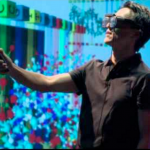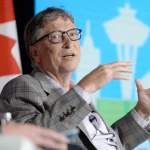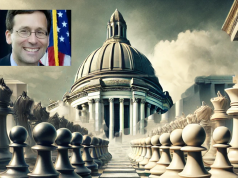Microsoft’s Moon Shot Aims to “Solve” the Cure for Cancer
 Could the next breakthrough in finding a cure for cancer come not from cell tagging but from data tagging, mining the information technology process before the medical protocol?
Could the next breakthrough in finding a cure for cancer come not from cell tagging but from data tagging, mining the information technology process before the medical protocol?
A team of researchers at Microsoft is using machine learning and natural language processing to help the world’s leading oncologists figure out the most effective, individualized cancer treatment for their patients, by providing an intuitive way to sort through all the research data available.
Another team is pairing machine learning with computer vision to give radiologists a more detailed understanding of how their patients’ tumors are progressing.
Yet another group of researchers has created powerful algorithms that help scientists understand how cancers develop and what treatments will work best to fight them. And another team is working on moonshot efforts that could one day allow scientists to program cells to fight diseases, including cancer.
Although the individual projects vary widely, Microsoft’s overarching philosophy toward solving cancer focuses on two basic approaches, said Jeannette M. Wing, Microsoft’s corporate vice president in charge of the company’s basic research labs.
One approach is rooted in the idea that cancer and other biological processes are information processing systems. Using that approach the tools that are used to model and reason about computational processes – such as programming languages, compilers and model checkers – are used to model and reason about biological processes.
The other approach is more data-driven. It’s based on the idea that researchers can apply techniques such as machine learning to the plethora of biological data that has suddenly become available, and use those sophisticated analysis tools to better understand and treat cancer.
“The collaboration between biologists and computer scientists is actually key to making this work,” Wing said. [24×7]
Traveling the Cascadia Innovation Corridor between Seattle and Vancouver (at 200 mph!)
 Bill Gates, Microsoft CEO Satya Nadella, other regional CEOs, key elected officials, and international experts have convened this week at the Emerging Cascadia Innovation Corridor Conference in Vancouver, British Columbia, for a thought-provoking look at how Seattle and Vancouver can work more closely together to create an international hub for innovation.
Bill Gates, Microsoft CEO Satya Nadella, other regional CEOs, key elected officials, and international experts have convened this week at the Emerging Cascadia Innovation Corridor Conference in Vancouver, British Columbia, for a thought-provoking look at how Seattle and Vancouver can work more closely together to create an international hub for innovation.
The tech industry is the second fastest growing industry in British Columbia, according to KPMG.In 2015, Seattle and Vancouver both ranked in the Top 20 world’s leading startup cities according to Compass, as they did in 2012.
Accelerating the development of a world-class innovation corridor will take transformational efforts including transportation initiatives to shrink the not insubstantial distance between the two cities.
King County Executive Dow Constantine speculated that trains could travel 200 to 250 miles per hour and be equipped with the latest technology to process international customs identification for travelers.
Seattle’s Madrona Venture Group has advanced an alternative idea, publishing a report on Monday entitled the “Autonomous Vehicle Plan for the I-5 Seattle/Vancouver B.C. Corridor” that proposes hands-free vehicles taking over HOV lanes . Leading technology companies, such as Tesla and Uber, and traditional auto companies, such as Ford and GM, are rapidly developing and testing new technologies in sensors and software that will make fully autonomous vehicles feasible and safe within the next five to ten years.
Surprisingly, a recent study of LinkedIn data surprisingly indicated that connectivity of business people between the two cities is low relative to connectivity with other cities. “Among the cities with the strongest connection to Vancouver, Seattle ranks #11, behind three other US cities. Similarly, Seattle has stronger connections with 26 other cities, compared to Vancouver.” Overall cross-border talent flow is also limited even though Microsoft and Amazon have large offices in Vancouver. [24×7]
Mike Daisey on Donald Trump: It Takes One to Know One
 Mike Daisey, who got his start in Seattle with “21 Dog Years,” a solo show about working at Amazon.com in the early days, will present “The Trump Card” this Thursday evening at The Neptune Theater.
Mike Daisey, who got his start in Seattle with “21 Dog Years,” a solo show about working at Amazon.com in the early days, will present “The Trump Card” this Thursday evening at The Neptune Theater.
The solo performance dissects Donald Trump’s “skill set” (which Daisey claims rivals his own) as “a lesson and a warning.” Daisey: “It’s like the classic magician’s trick where a magician deconstructs what another magician showed you — Donald Trump is a performer, I’m a performer, and I’m uniquely qualified to tell you why his campaign works.”
“The Trump Card” began as a character study 14 months ago. Daisey, who now lives in New York City, contends that Trump owes a lot of his success to Roy Cohn, the right-wing attorney recently described by The New York Times as “Senator Joseph McCarthy’s Red-baiting consigliere,” and who worked with Trump for over a decade. [24×7]

















